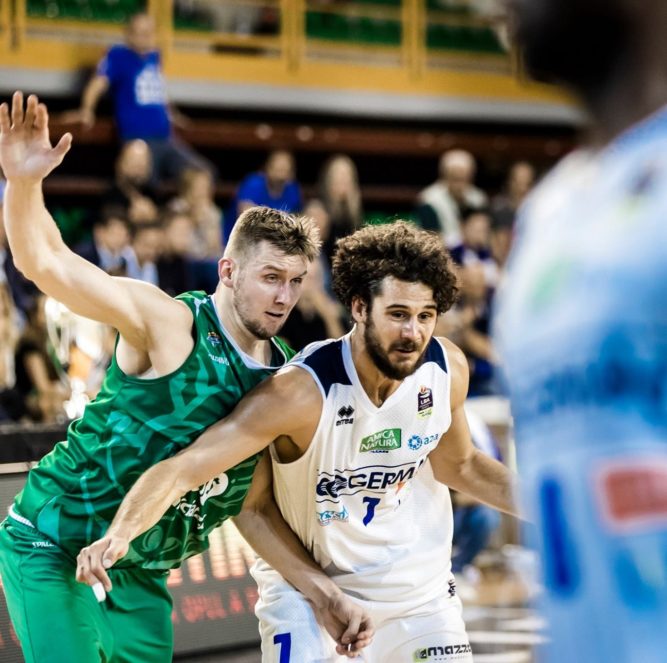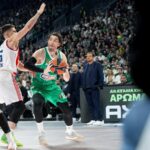
Nicolò Origgi charts the road back to relevance for the once promising Luca Vitali. The Italian guard went from prospect to punchline but has fought his way back to relevance as he looks to breathe new life into Brescia in Serie A
“A basket makes one guy happy, an assist makes two guys happy” – this has traditionally been the philosophy of some among the greatest passers in the history of the game throughout the generations. While the origin of such quote is sort of uncertain, it has generally been attributed to the man who used to hold the Italian league record for most dishes in a single game. Why was the past tense used in the last sentence, though? Because the sixteen-dime-mark set by the Croatian Pink Panther back in the 1992/’93 season has slipped to second place for almost a year, eclipsed twice by a domestic passing artist who has turned his career around in spectacular fashion after a number of heavy professional setbacks.
Overshadowed by the likes of youth ranks’ teammates Marco Belinelli and Luigi Datome, as well as Andrea Bargnani and the slightly younger yet precocious Danilo Gallinari, Luca Vitali had to work his way up. Following a promising senior debut in the third division at only eighteen, LegaDue side Montegranaro gave him the chance to make a step forward under the wing of a globetrotting alpha male such as Randolph Childress. The presence of such a natural-born leader at the helm, however, soon forced him away from his usual playmaking role with mixed results – an issue which would resurface multiple times. With the departure of the man who teamed up with Tim Duncan at collegiate level once promotion to Lega A and a comfortable permanence had been achieved, Vitali could finally step into the driver’s seat. A deluxe summer signing helped the transition as the two-man partnership with explosive big man Sharrod Ford somehow anticipated the LA-based Lob City by a good half-decade. Having earned the status of local hero also thanks to a game-winning deep three in a heated derby at Pesaro’s Adriatic Arena, the lanky boy with a love for Theo Papaloukas was apparently ready for bigger challenges.
Quite predictably, both due to the appointment of former Sutor general manager Lucio Zanca and the fact that it struggled to knock the tiny team from Marche out of the playoff quarterfinals, Olimpia Milan snatched Vitali and immediately handed him a starting gig in spite of some legit competition from heralded veteran Massimo Bulleri. A terrible first half of the season that saw Armani Jeans fail to qualify for the national cup Final Eight, though, was only partly mitigated by a last-gasp Euroleague Top-Sixteen berth clinched on the heels of Vito’s career-best thirty-two points on seven-for-nine three-point shooting. In spite of this, the Virtus Bologna alumni’s erratic play ultimately led the club’s management to sign a more experienced point man such as Hollis Price. Forced away from the ball and the supposed pressure arising out of its handling, Vitali hit instead a slump to the point that the hard to please Milanese crowd repeatedly booed the guy who was supposed to replace NY-bound Gallinari in their cold hearts. Divorce was thus unavoidable, but Virtus Roma offered the humbled golden boy a second chance nonetheless. Also in the Italian capital, however, Luca would soon fall victim to the recurring misunderstanding around his true position as the squad’s point guard spots were already filled by Ibrahim Jaaber – a man who, not before being granted a random Bulgarian citizenship, would choose to give up a successful sports career due to his strict religious beliefs – and fellow Italian backup Jacopo Giachetti. Throughout a number of coaching as well as roster changes amid two extremely dismal seasons, Vitali could not therefore stop his downward spiral and was easily made the scapegoat for the team’s failures also by the equally detached Rome fanbase. Obviously struggling to find a new accommodation after those nightmarish campaigns, he was given an helping hand by the club who had long nurtured him in the youth ranks before a quick – yet successful – stop in Siena. While this simple fact and the reassuring presence of his younger brother Michele in the squad looked like solid premises for a possible rebirth, the timing of his comeback to Virtus could not be more wrong as the suddenly retiring Terrell McIntyre urged to be replaced. Although T-Mac was by then a shell of his Mens-Sana self and a viable second option such as Giuseppe Poeta had already been brought on the ship to share the workload, the prodigal son was put under scrutiny since the very beginning also because of his early struggles. The idyllic home atmosphere would thus backfire as dissatisfaction rapidly mounted around the elder Vitali and another fair share of boos – arguably the most painful – went on to hit him.
At only twenty-six, the young prospect that put a small shoemaking-oriented town on the basketball map had in the meantime turned into a punchline, being envisioned as the living stereotype of your average overhyped Italian baller that gets mistaken for a sure-shot phenom, only to fall down to Earth miserably as soon as the stakes get higher. In spite of such infamous reputation, there was still someone willing to trust his long-missing abilities enough to offer him a job as a basketball player. No more powerful clubs knocked on the door but, after all, Vanoli Cremona could represent a brand new start to find back the most important thing to any athlete – the love for the game. After some initial hiccups that severely tested also local supporters’ patience, Vitali finally shook the rust off his mind and started showcasing an unprecedented all-around skillset where his rediscovered shooting touch – no matter about his push-shot kind of form – and pick-and-roll passing prowess were just the icy on the cake. An improved in-between game as well as a newfound knack for attacking the hoop and posting up any backcourt opponent given his length earned him a move – likely favoured by two inspired outings in head-to-head matchups – to up-and-coming Reyer Venice. On the lagoon, though, people would only see glimpses of the reborn player from the previous campaign as his lone career Eurobasket participation – though, once more, as a misused fringe guard-forward in spite of Italy’s self-evident shortage of proven point guards in Daniel Hackett’s absence – made him run out of gas a bit too early. A marked late-season decline for the whole team led therefore to a failed postseason hunt or, in other words, no contract renewal.
Since mutual gratitude never stopped linking Vitali and Cremona following his departure, both parties were willing to write a second chapter to their love story. A silent villain under the form of an early stress fracture to Luca’s right foot, though, made its unnecessary appearance. Remarkably, Vanoli’s newly appointed captain held on throughout the whole season, missing only a handful of games as the team never risked relegation under his steady leadership. The following year, however, he was presented with the bill for such a willingness to sacrifice his body right while his teammates were setting new club records – an eight-game winning streak that helped securing a Coppa Italia as well as playoffs debut. A brief cameo in the Spanish ACB playoffs halfway between these two campaigns on the Po river’s bank probably did not help preserve Vitali’s health, either. For these reasons, having seemingly reverted to his old three-point-chucking self – much to the detriment of his late-blooming versatility – with awful results as the injury had clearly taken its toll, the number seven was surprisingly let go without any apparent regrets. Only about thirty-five miles northeast of the late Antonio Stradivari’s hometown, however, there were no second thoughts about giving free rein to the battered yet still capable floor general. No choice could be happier as the now respected veteran put a relatively shorthanded and unexperienced Leonessa Brescia side on his shoulders alongside former Siena and Milan’s defensive ace David Moss, being reunited with his now mature brother in the process. Come to terms with the heritage of his past nagging condition, he managed not only to stay healthy throughout the whole year but also to play every match while logging a career-high thirty-three minutes per contest for the white-and-blue Lega A newcomers. Embracing an even more emphasized facilitating role, Vitali further stepped his passing game up – something that could reasonably seem hard to believe – by connecting with teammates from virtually any spot of the hardwood through timely pinpoint lobs, bounce passes and no-look bullets – either in transition or early in half-court offensive sets. Under his guidance, Leonessa calmly overcame a difficult start to qualify for Coppa Italia and knock out future Scudetto winner Venezia in the competition’s quarterfinals. The challenge for the upcoming season is to improve such already positive results, a feat that does not look impossible at all as long as the ball is in the once belittled man’s hands.
While we can only guess whether he has ever heard about the motto in the opening lines, one thing is for sure. Luca Vitali and the countless lucky companions that he has shared the floor with must really be the happiest men in the world.




Leave a Reply